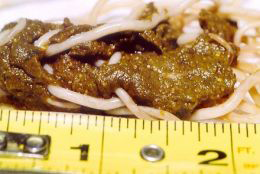
Canine
 Fecal testing is a microscopic examination of your dog’s feces (poop) to detect parasite eggs that are invisible to the naked eye. It is the only way to detect many internal parasites, unless your pet passes adult worms in their feces or by vomiting the adult worms. The fecal sample should be fresh as the longer the feces sit the more likely the parasites will hatch and we will be unable to detect them. You should also be aware that there is several different types of fecal testing that must be used to detect different intestinal parasites.
Fecal testing is a microscopic examination of your dog’s feces (poop) to detect parasite eggs that are invisible to the naked eye. It is the only way to detect many internal parasites, unless your pet passes adult worms in their feces or by vomiting the adult worms. The fecal sample should be fresh as the longer the feces sit the more likely the parasites will hatch and we will be unable to detect them. You should also be aware that there is several different types of fecal testing that must be used to detect different intestinal parasites.
Internal parasites shed eggs in regular or irregular cycles so repeat fecal examination are required to ensure that your pet is free of intestinal parasites.
Internal parasites can damage your pet’s gastrointestinal tract and impair normal growth and development. Since most pets have intestinal parasites it is common to de-worm pets on a regular basis, especially puppies and also do repeat fecal examinations to ensure that your pet has been properly de-wormed.
Most puppies have roundworms, which are intestinal worms that can cause vomiting, diarrhea, and other gastrointestinal signs (although dogs and cats can have worms without showing any symptoms). It is important for puppies to be treated for roundworms, not only to rid them of the infection but also to prevent you and the rest of your family from becoming infected. Roundworms are a zoonotic parasite, which means they can be transmitted from pets to people. Since we are not the “proper host” migrating worms can get lost and end up in a human eye resulting in blindness or cause other serious health problems. By ensuring that your puppy is treated properly, you can keep your entire family safe from these and other parasites.
External parasites such as fleas, ticks, skin mites and ear mites are also common in pets, especially young pets that have not yet developed a strong immune system. During your visit to us we will examine your pet for these pests. Fleas carry tapeworms, thus dogs/cats who get fleas should be treated for tapeworms.
Feline
Fecal testing is a microscopic examination of your kitten’s feces (poop) to detect parasite eggs that are invisible to the naked eye. It is the only way to detect many internal parasites, unless your pet passes adult worms in their feces or by vomiting the adult worms. The fecal sample should be fresh as the longer the feces sit the more likely the parasites will hatch and we will be unable to detect them. You should also be aware that there is several different types of fecal testing that must be used to detect different intestinal parasites.
Internal parasites shed eggs in regular or irregular cycles so repeat fecal examination are required to ensure that your kitten is free of intestinal parasite. Internal parasites damage your kitten’s gastrointestinal tract and impair normal growth and development.
Since most pets have intestinal parasites it is common to de-worm pets on a regular basis, especially kittens and also do repeat fecal examinations to ensure that your pet has been properly dewormed.
Most kittens have roundworms, which are intestinal worms that can cause vomiting, diarrhoea, and other gastrointestinal signs (although kittens can have worms without showing any symptoms). It is important for kittens to be treated for roundworms, not only to rid them of the infection but also to prevent you and the rest of your family from becoming infected. Roundworms are a zoonotic parasite, which means they can be transmitted from pets to people. Since we are not the “proper host”, migrating worms can get lost and end up in a human eye resulting in blindness or cause other serious health problems. By ensuring that your kitten is treated, you can keep your entire family safe from these and other parasites.
External parasites such as flea, ticks, skin mites and ear mites are also common in pets, especially young kittens that have not yet developed a strong immune system. During your visit to us we will examine your pet for these pests. Fleas carry tapeworms, thus cats who get fleas should be de-wormed for tapeworms.

